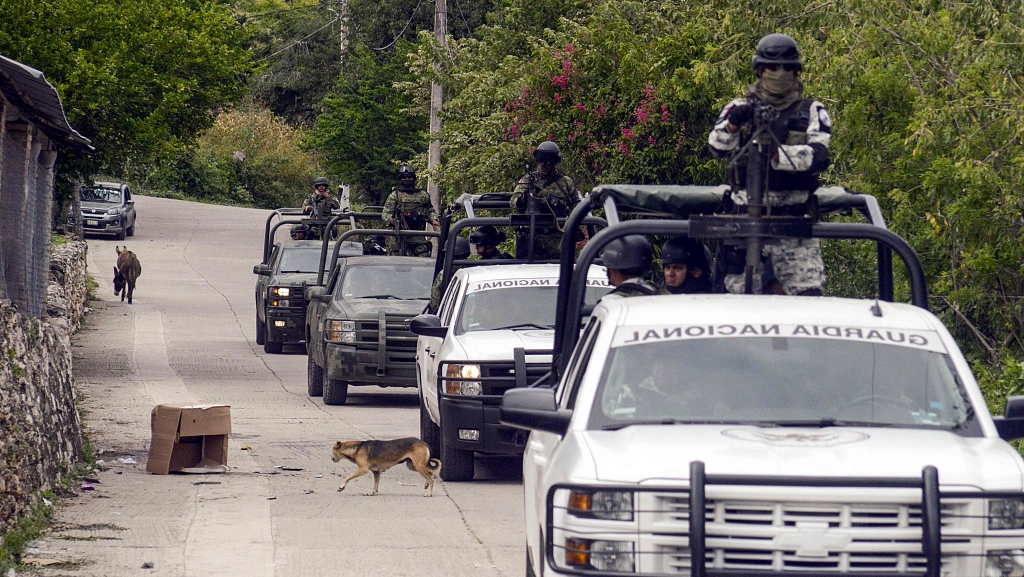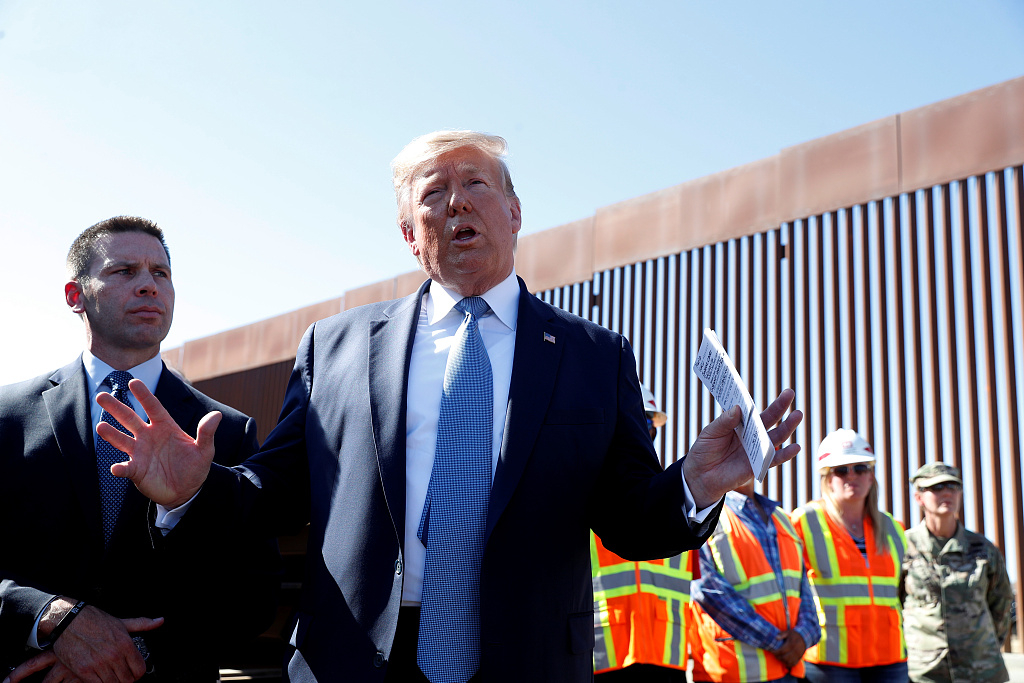
Mexico's National Guard drive by the site where a confrontation between the Mexican Army and armed civilians took place in Tepochica, Mexico, October 16, 2019. /VCG Photo
Mexico's National Guard drive by the site where a confrontation between the Mexican Army and armed civilians took place in Tepochica, Mexico, October 16, 2019. /VCG Photo
Editor's note: Andrew Korybko is a Moscow-based American political analyst. The article reflects the author's opinion, and not necessarily the views of CGTN.
Analysts all over North America are busy discussing U.S. President Donald Trump's revelation that his administration has already undertaken the formal process to designate some Mexican cartels as terrorists. This marks a dramatic departure from the approach of every one of his predecessors, which he believes is a long-overdue and reasonable step for finally tackling a simmering security crisis that directly affects both countries.
That said, the consequences could be immense, and also easily exploited as an opportunity for the U.S. to deepen its overall influence over Mexico. If successfully promulgated into official policy, here's what it might fully entail:
The War on Drugs 2.0
It can be expected that the U.S. will ramp up its "War on Drugs" on the basis that it's now a national security issue inextricably connected to terrorist groups, possibly leading to new mandatory minimum sentences for high-level suppliers who purchase illegal substances from them and are therefore technically "financing terrorism."
National expansion of drug treatment centers
It would naturally follow that the Trump administration might invest more heavily into the national expansion of drug treatment centers to combat the opioid and other substance epidemics, also to reduce the domestic demand for these drugs and thereby serve as an economic deterrent to terrorist traffickers.
Human trafficking crackdown
Concurrent with the nationwide crackdown on drugs via the "War on Drugs 2.0," American law enforcement agencies will probably also focus more attentively on combating human trafficking, not just in the sexual sense but also the broader one of illegal immigration seeing as how terrorist-designated cartels might be involved in both.
Nationwide ICE raids
The Immigration and Customs Enforcement (ICE) body might predictably stage nationwide raids in order to remove all individuals connected to terrorist-designated cartels, including workplace raids and other dramatic incidents, though this might also set up a political conflict over so-called "sanctuary cities" that could be abused by terrorist-designated cartels to evade the security services.
More muscular border security
It's a no-brainer that Trump will seek to use his administration's forthcoming designation of some Mexican cartels as terrorists to push his border security agenda, up to and including the permanent or "rotational" presence of the U.S. military along the Mexican frontier on the basis that their deployment is needed to more effectively combat terrorist infiltration into the country.

U.S. President Donald Trump visits a section of the U.S.-Mexico border wall in Otay Mesa, California, U.S., September 18, 2019. /VCG Photo
U.S. President Donald Trump visits a section of the U.S.-Mexico border wall in Otay Mesa, California, U.S., September 18, 2019. /VCG Photo
Blacklisting Mexican officials, institutions and municipalities
Mexican officials, institutions and even entire municipalities could be blacklisted by the U.S. if it regards them as being co-opted, influenced, and/or infiltrated by any of the terrorist-designated cartels, thus putting immense pressure on the national government there to undertake transparent, verifiable and effective action to counteract this trend under the pane of having their ties with their northern neighbor severely curtailed.
Restricting remittances to Mexico
Should the above-mentioned tangential policy be implemented, then it would make sense for the U.S. to restrict remittances to the Mexican officials, institutions, municipalities, and even private individuals allegedly connected with terrorist-designated cartels, and any of their investments in the U.S. (including bank accounts) could be frozen or seized in the worst-case scenario.
Imposing secondary sanctions against foreign non-compliant third parties
The U.S. has proven its willingness to impose secondary sanctions against those entities that don't abide by its anti-Iranian sanctions, so it's absolutely conceivable that it might do the same against those who don't abide by its possible anti-terrorist ones against Mexico, all with the intent of putting enormous pressure on the authorities to either "clean house" or risk the entire nation collapsing into an outright failed state.
Support to the Mexican government
It's extremely likely that the U.S. will extend all manner of indirect (e.g. logistical, intelligence) support to the Mexican state and even offer some limited direct support (e.g. joint anti-terrorist raids) too under certain circumstances, which could greatly help the country eradicate its terrorist threat but also be easily abused by the U.S. to deepen its overall influence over Mexico once the "War on Terrorism" there finally ends, if ever.
(If you want to contribute and have specific expertise, please contact us at opinions@cgtn.com.)